5.2 Magnitude Earthquake Rocks Central Croatia (& Update on Aftershocks)
December 28, 2020 - Another earthquake rocks central Croatia in 2020.
ARTICLE UPDATES:
Pokupsko: Initial Estimates Show Property Damage Caused by Earthquake Minimal
Von der Leyen: EC Following Situation in Croatia After Quakes Ready to Help
Damir Trut Talks Travel Passes for Petrinja Residents Following Quake
Milanovic and Plenkovic Visit Sisak and Petrinja After Earthquake
UPDATE: Two aftershocks were also felt in central Croatia, at 7:49 am and 7:51 am, waking up completely those who thought they might go back to sleep this Monday morning. The pair had their epicentres at a similar location, and their magnitudes were 4.7 and 4.1:
Dva #potres (#earthquake) 28.12. kod Petrinje, M4.7 u 07:49 i M4.1 u 07:51. Opširnije na https://t.co/p5PZlbx90l. Ako ste osjetili potres, molimo javite na https://t.co/E7EOdDpWtn
— Seizmološka služba HR (@seizmo_hr) December 28, 2020
The Croatian Seismological Service reported that the earthquake was 5.0 magnitude:
#potres (#earthquake) 28.12 u 06:28 M5.0, 5 km jugozapadno od Petrinje. Ako ste osjetili potres, molimo javite na https://t.co/RJDaIJlwpM
— Seizmološka služba HR (@seizmo_hr) December 28, 2020
Izvješće ćemo objaviti u komentaru.
Namely, at 6:28 Monday morning, the quake was 5.2 magnitude, according to the first EMSC estimate. The epicenter of the earthquake was 49 km SE of Zagreb and 12 km NE of Sisak, felt mostly in and around Petrinja.
The quake occurred 2 km below the ground, according to Hina.
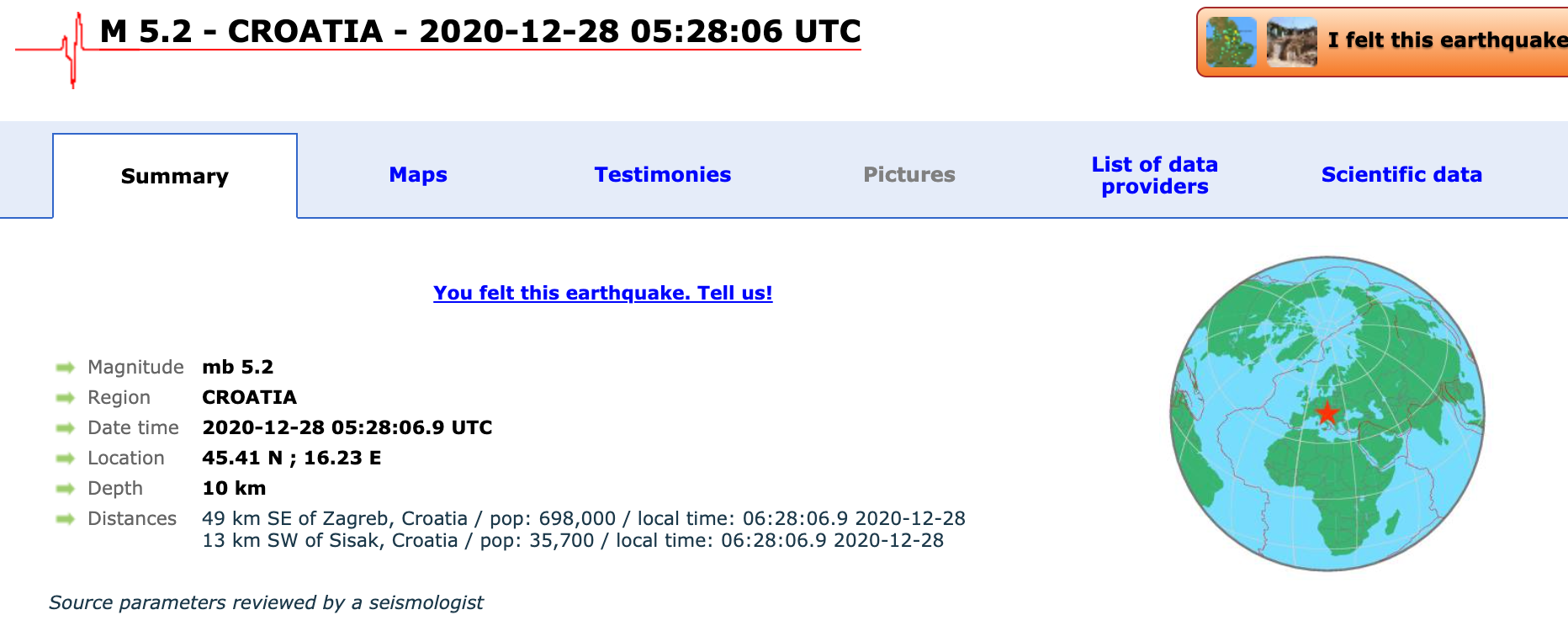
Recall that in March, Zagreb and its surroundings were hit by two earthquakes of similar strength. At dawn on March 22, at 6:23 am, Zagreb was hit by a magnitude 5.5 earthquake. After that, five more earthquakes occurred, of magnitude 3 to 5 on the Richter scale.
Mayor Milan Bandic sent a message to the people of Zagreb: "Unfortunately, we have again felt a strong earthquake in the Zagreb area. Fortunately, for now, there is no information on serious damage, and I hope it will remain so. However, in case anyone is in need, free telephone lines are open (0800 8802 and 0800 8805) through which you can ask for help or necessary assistance from city services. This is a difficult year for all of us but we must be together and we must not forget about health and the invisible enemy at this time."
The Civil Protection. HQ also shared a statement this morning: "According to the Seismological Service, an earthquake of magnitude 5.0 on the Richter scale, Intensity VII of the EMS scale, was recorded in the Petrinja area on December 28 at 06:28. According to the first information, reports of damaged buildings and vehicles have been received, and so far there is no information on injuries. Citizens are asked to comply with the measures in force to prevent the spread of the new coronavirus infection if they need to leave their homes due to the earthquake."
Free telephone lines have been opened through which the citizens of Zagreb can request help and assistance from the city services after the earthquake. The phone numbers are 0800 8802 and 0800 8805.
Quite a lot of damage has been reported in Petrinja, Sisak, Glina and in the region. No damage has been reported in Zagreb so far.
More news soon... Hopefully, we won't update this article with any news of additional aftershocks.
To read more about news in Croatia, follow TCN's dedicated page.
Google Search Croatia: What Did Croatia Google Search Most in 2020?
December 9, 2020 – It's been a funny old year. Funny as in unusual. Not so much funny haha. The extraordinary nature of the year is reflected in the most-popular Croatia Google search list for 2020, which has just been published. This year's searches hold a stark contrast to last year's.
In 2019, the end-of-year list for Croatia Google search was dominated by results for sporting fixtures, celebrities and entertainment. Although the EU election results and the long-running teacher's strike in Croatia also scored highly in 2019, this year has been dominated by searches of an even more serious and pressing nature.
It will come as no surprise to anyone that the number one Croatia Google search for 2020 was Coronavirus. The global pandemic is likely to top lists all over the world. In this country, its ramifications also created several other high-ranking inclusions on the Croatia Google search list 2020.
Software Google Classroom and Office 365 za škole also feature in the top 10 Croatia Google search list 2020, as parents and students coped with the closure of teaching institutions and prepared to learn and receive lectures online. Another piece of online tech that features in the top 10 was ePropusnica, the travel pass required for inter-regional travel and international travel by car during the various stages of lockdown. If these results are anything to go by, Coronavirus has dominated the lives of Croatians in 2020.
Another big Croatia Google search term in 2020 was Zagreb earthquake. For anyone in Zagreb at the time of the first large tremor, this will also come as little surprise – it was the biggest earthquake experienced for 100 years in Croatia, and it came without warning. Though lasting just a few seconds, there was no reaction more immediate than that of city residents, who ran out into the streets partially clothed. Thousands must have searched the term to find out what was happening, and also after many of the hundreds of aftershocks that have followed.
Here's the list of biggest Croatia Google search terms in 2020
The most-popular Croatia Google search terms in 2020
1. Koronavirus
2. Google Classroom
3. Office 365 za škole
4. Potres Zagreb (Earthquake Zagreb)
5. Kobe Bryant
6. ePropusnica
7. Izbori SAD (US elections)
8. DIP
9. Joe Biden
10. Masoni (Masons)
The most-popular Croatia Google search apps in 2020
1. ePropusnice
2. Zoom
3. Andrija
The most-popular Croatia Google search events in 2020
1. Potres (Earthquake)
2. Izbori SAD (US elections)
3. Izbori (elections)
Aside from the inclusion of the Masons (freemasons), the list is understandable on an international level. It perhaps tells us something about how Croatians use the search engine and how well they respect it as a source for delivering credible information. With Coronavirus vaccines now announced and, all hope, the biggest potential earthquake out of the way, for now, it's understandable for most Croatians to be looking forward to the return of more trivial matters dominating their Google searches in 2021.
'From Earthquake to Earthquake 1880-2020' Exhibition Opens
ZAGREB, November 25, 2020 - An exhibition called "From Earthquake to Earthquake 1880-2020" was opened at the Museum of Arts and Crafts on Tuesday, marking the museum's 140th anniversary.
Among those attending were President Zoran Milanovic and Culture Minister Nina Obuljen Korzinek.
Over the past 150 years, compared with other cities in Europe, Zagreb has actually suffered very little in this earthquake area, an area of unrest, war, suffering, killing. Zagreb has been trampled, destroyed, set on fire, bombed relatively little compared with them, the president said.
"May this which happened at the end of March this year be and remain one of the biggest afflictions we... experienced," the president said, referring to the March earthquake.
Zagreb is a beautiful city, among the 20 most beautiful in Europe, and it "is waiting to be finally and definitely touched up, which will require a partnership between citizens, owners, the city and the Croatian state," said Milanovic
Minister Obuljen Korzinek said the exhibition was aimed at showing people just a small piece of the damage museums and cultural assets in Zagreb sustained in the March earthquake.
She recalled that the European Parliament decided on Monday to give Croatia €680 million from the Solidarity Fund to deal with the aftermath of the earthquake, including over €100 million intended for the reconstruction of the cultural heritage.
After Tumultuous 2020, Investors Think Twice About Zagreb Property
November the 20th, 2020 - Trends in life outside of big cities triggered by the pandemic had a greater impact on the decline in the sale of Zagreb property than the consequences of the earthquake did, according to the author of an expert article published on HNBlog on Monday.
As Poslovni Dnevnik writes, the authors of the expert article "The impact of the pandemic and the earthquake on the property market in Zagreb in the first half of 2020" saw the CNB's Davor Kunovac and Karlo Kotarac analyse the simultaneous impact of the earthquake which occurred back in March this year and the pandemic declared on March the 11th.
The two experts looked into the formation of real estate prices in Zagreb and have constructed a number of specific indicators of the Zagreb property market using data from the Tax Administration on the sale of said property.
A reduction of 10 percent
"The analysis showed that during May and June, the prices of Zagreb property being sold in the very centre and in Donji Grad, where buildings seriously damaged during the earthquake was the most densely distributed, decreased by 10 percent compared to the same period last year," the authors say.
According to that same data, "the number of properties sold in Zagreb in the first half of 2020 is approximately 22 percent lower when compared to what was sold in the same period last year and for now, it doesn't seem dramatic if we take into account the usual trends in transactions in previous years.
Namely, Kunovac and Kotarac note that the intra-annual dynamics of the number of sold properties changed back in 2017 with the introduction of the housing loan subsidy programme and a large number of transactions are now concentrated within a short time interval in which subsidy applications are opened.
However, unlike the previous two years, the decline in the number of transactions this time has lasted significantly longer, until May 2020, when, in parallel with the easing of epidemiological measures and a new round of housing subsidies, the number of transactions again approached the average recorded over the previous two years.
"The number of properties sold within the city and especially in Donji Grad, where the properties damaged in the earthquake was most densely distributed, has halved in recent months," said Kunovac and Kotarac. However, they also pointed out that the reduced tendency to buy Zagreb property in the very heart of the city center should not be entirely attributed to the earthquake.
"The indicators illustrate that the number and share of transactions related to the earthquake-damaged zone begins to decline a few weeks before the earthquake actually struck. This decline in activity in the real estate market coincides with the beginning of the pandemic when the process of buying and selling real estate was significantly hampered by the introduction of epidemiological measures.
The reduced activity in this area is in line with the increased attractiveness of living outside of the city centre and new trends in people's lifestyles which were triggered by the pandemic, such as social distancing or working from home,'' the authors of the article emphasised.
Not only newer apartments are desired...
The pandemic, as they further state, is closely related to the reduced demand for tourism in Zagreb. As a result, there is less demand for Zagreb property in the heart of the city that would otherwise have had a tourism-related purpose, while, at the same time, the supply of apartments for long-term rent or purchase in that part of the city is indeed growing.
Their analysis also suggests that a change in buyer ''preferences'' for living outside the city centre after the earthquake is not, as is sometimes claimed, largely determined by increased demand for newer properies built after 1964 when the first earthquake-building regulations were enacted in the city.
Namely, a comparison of the price index of older properies in Zagreb showed that the price of these buildings located in the old part of the city fell in the analysed time, while the price of propertoes built before 1964 in other parts of the city rose in that period.
For the latest travel info, bookmark our main travel info article, which is updated daily.
Read the Croatian Travel Update in your language - now available in 24 languages
Meet Zagreb Volunteers, the Heart and Soul of the City
October 29, 2020 - TCN joins Zagreb Volunteers Centre in Čučerje to find out who are the Zagreb volunteers and why they do what they do. Čučerje is a semi-rural community which lies at the epicentre of the March 2020 earthquake.
By the time we ran out of the building, the first tremor had stopped. At 6:25am, the asphalt road lay quiet and motionless. People in pyjamas, nightgowns or underwear stood on the pavement. Others emerged even later. Although masonry in other parts of the city continued to fall, the 5.5 magnitude earthquake that visited Zagreb on 22 March 2020 was over. It had lasted much less than a minute. Its repercussions would last much longer.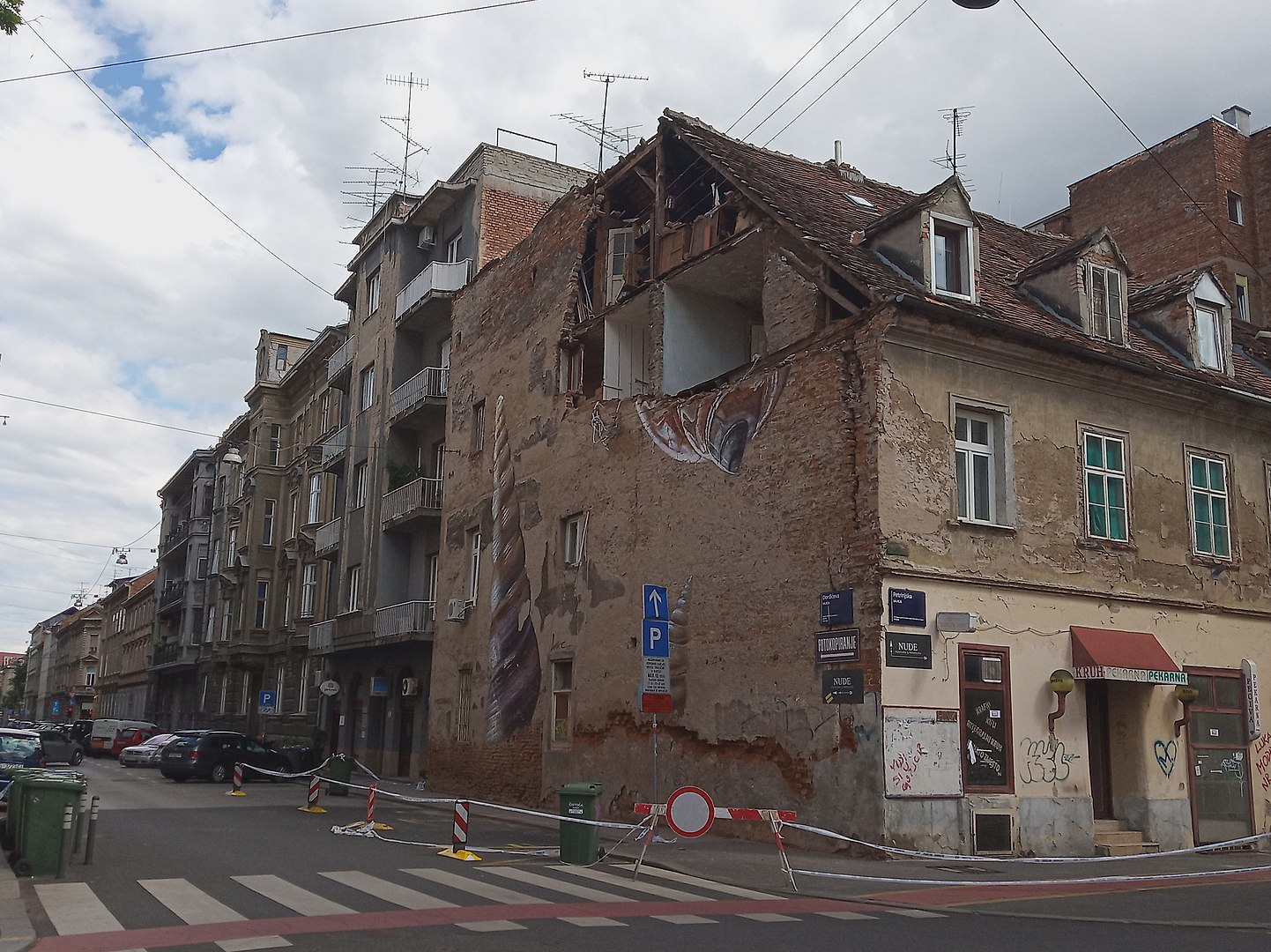 Damage to a Zagreb city-centre building in the 2020 earthquake © Franjo Tahy
Damage to a Zagreb city-centre building in the 2020 earthquake © Franjo Tahy
The tragic news of a fatality filtered through the media several hours later, as did pictures of the devastation visited upon the Croatian capital's buildings. Some of its oldest were hit particularly hard. However, most modern constructions had emerged largely unscathed. Acknowledging the area's seismic capabilities, everything built after the 1963 earthquake of Skopje in neighbouring Macedonia had been constructed to withstand such force.
Offers of help soon began to arrive from overseas. Despite international struggles related to Coronavirus, many still had sympathy upon hearing of the Zagreb earthquake. This outside sympathy and the media that prompted it were rarely directed to the semi-rural communities which experienced the earthquake's fiercest force.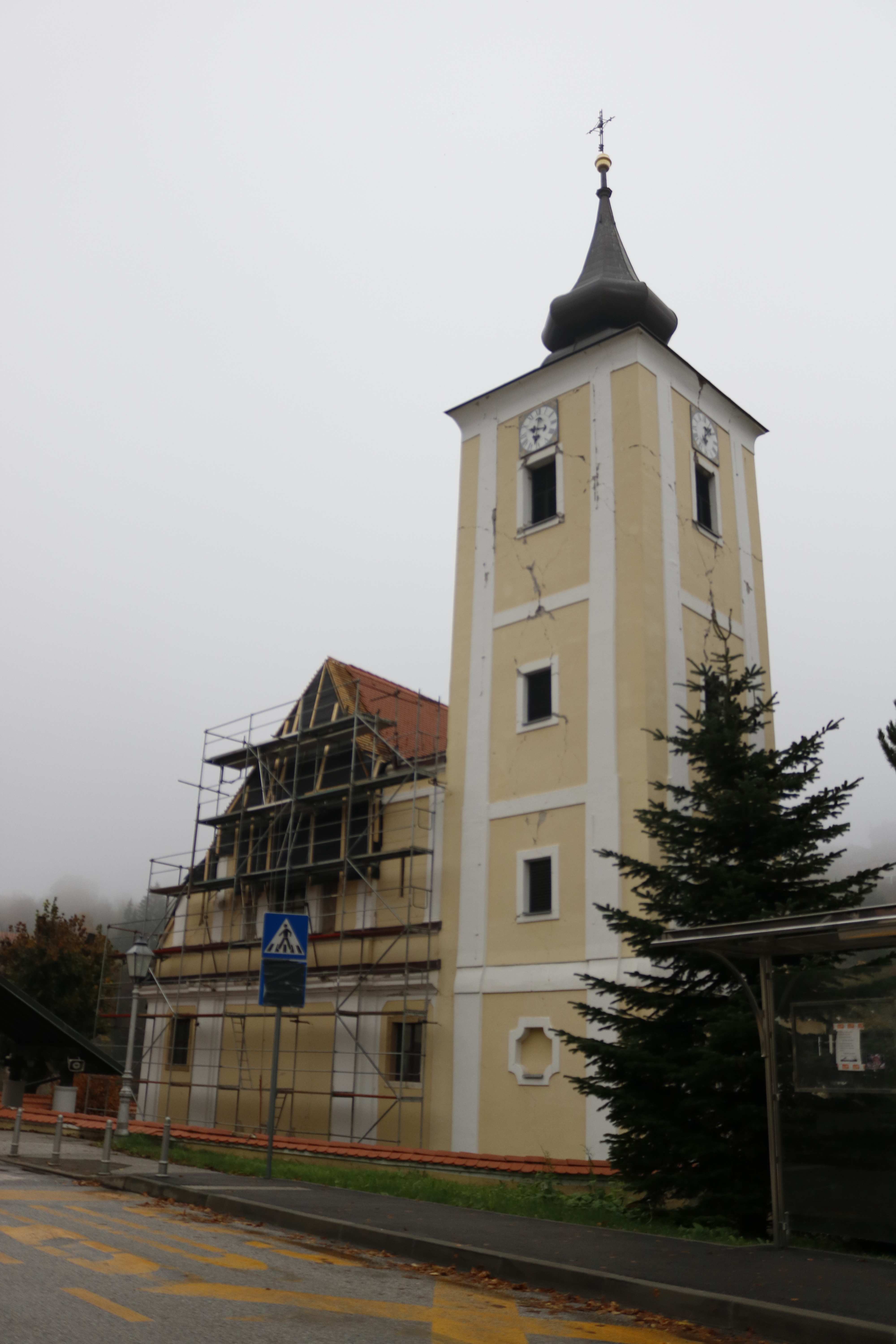 The front of the town church in Čučerje, surrounded by scaffolding seven months after the earthquake
The front of the town church in Čučerje, surrounded by scaffolding seven months after the earthquake
The small town of Čučerje is just short of 11 kilometres to the north-east of Zagreb city centre. In late October, the town looks impossibly pretty – houses perched in the foothills of Mount Medvednica, surrounded by greenery and trees exploding in a myriad of autumn shades. But, behind the colourful exterior lies a hidden suffering.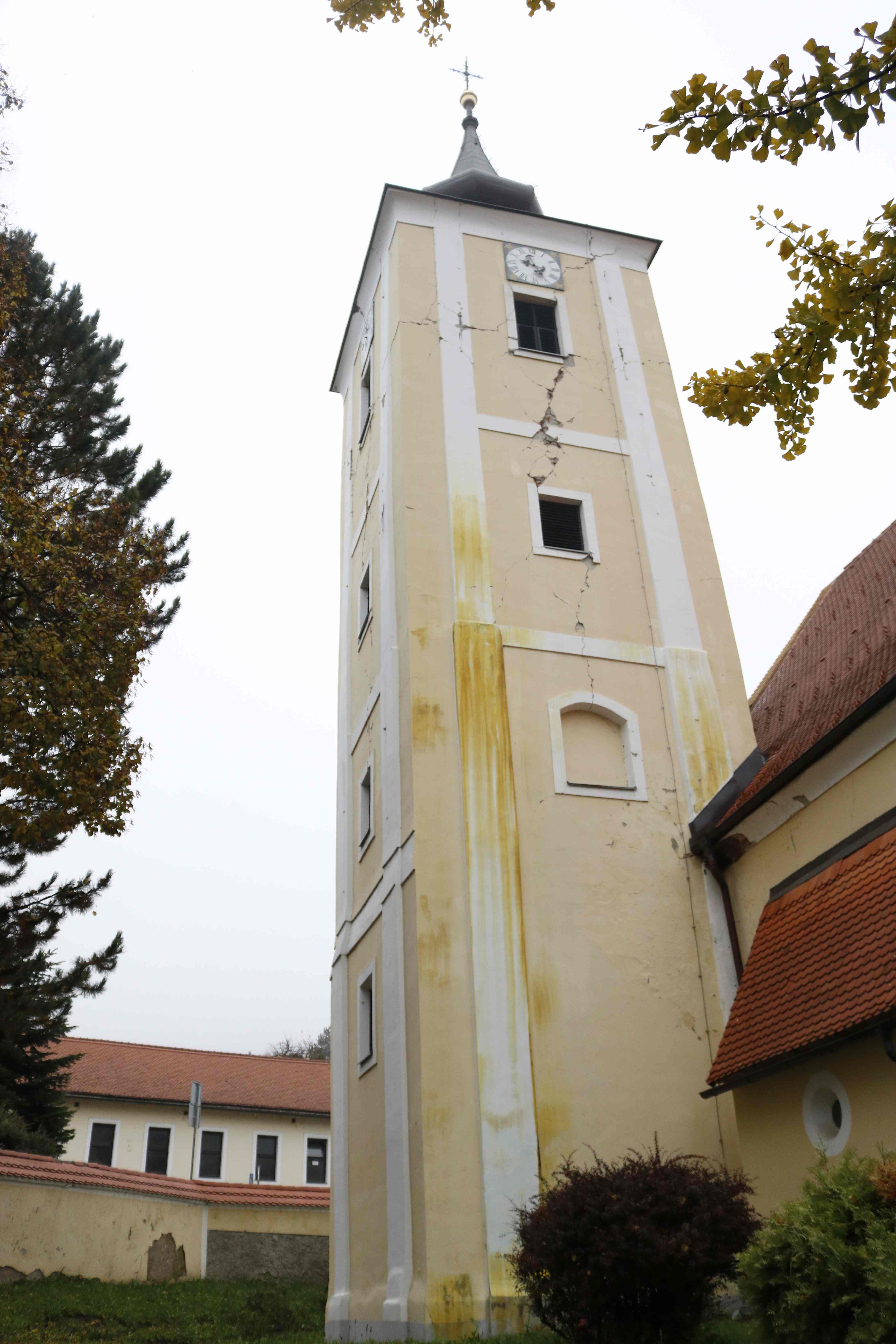 The spire of Čučerje's church is scarred on all sides by long-veined cracks
The spire of Čučerje's church is scarred on all sides by long-veined cracks
Čučerje lies just 500 metres from the epicentre of the earthquake. Scaffolding bolsters the town church, its spire scarred on all sides by long-veined cracks. Back from the main road, down simple, country lanes, sit houses much older than those standng proud above the centre. Here, life still exists in a way similar to that of the original residents of such dwellings. Elderly neighbours are preparing to heat their homes by wood-fired burners, chasing away the chill seeping in through the cracks the earthquake has left. As winter approaches, such hardships are not always reported as loudly as those faced by the damaged cultural institutions holding priceless collections in the capital. But, the struggle does not go unnoticed by Zagreb Volunteers Centre (VCZ).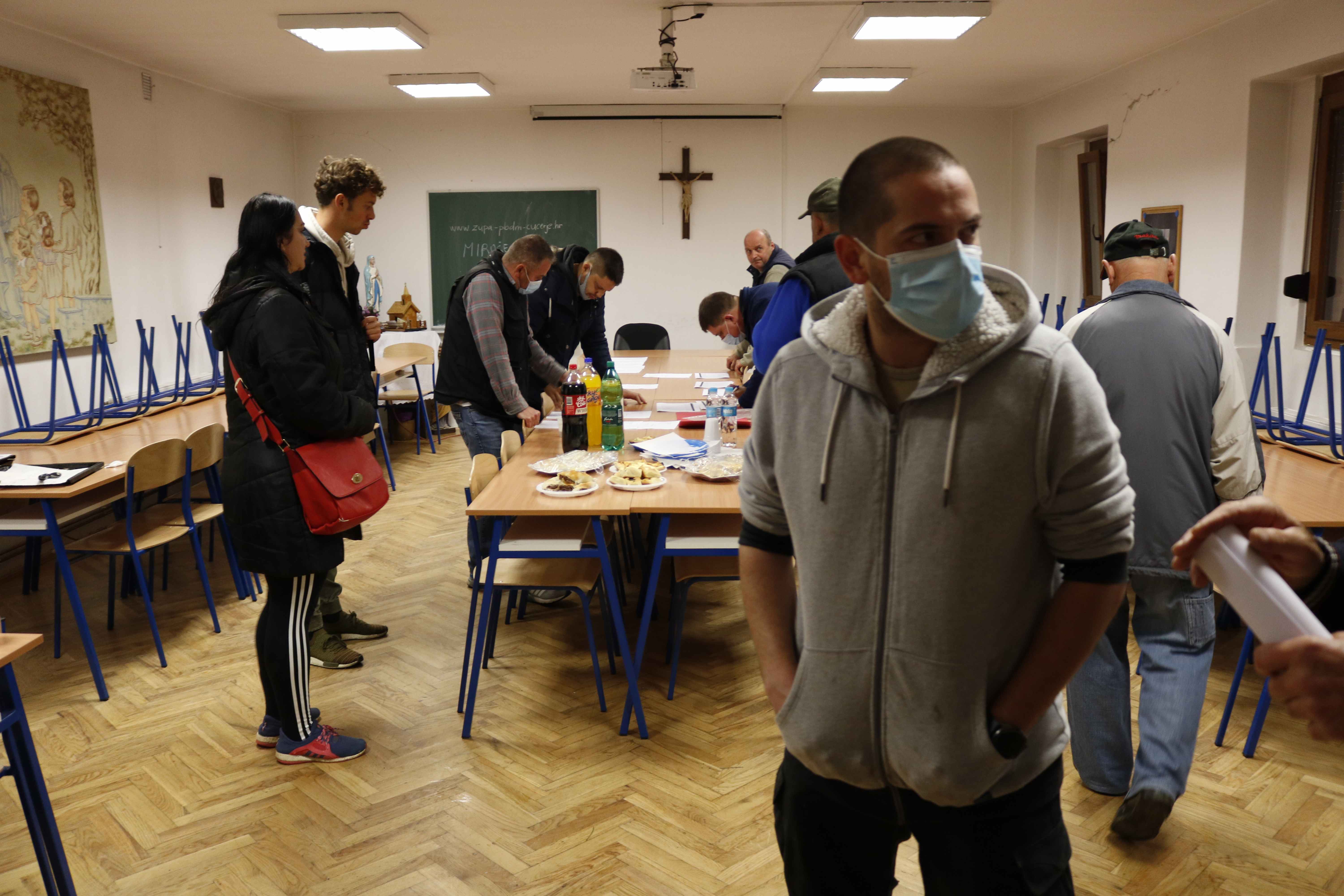 Čučerje residents and members of Zagreb Volunteers Centre meet in the community centre to plan the day's action
Čučerje residents and members of Zagreb Volunteers Centre meet in the community centre to plan the day's action
Established in 1998, Zagreb Volunteers Centre acts as a conduit between charities, communities and non-profit organisations who need support and those willing to donate their time to good causes. Since it was formed, over 18, 000 people have submitted their names to the centre as potential Zagreb volunteers who may be called upon. The centre has helped over 700 organisations find Zagreb volunteers.
“Before 1996, there was a set-up that facilitated international volunteering - it helped connect Croatians with international actions that were looking for help,” says 28-year-old Dunja Hafner, who works for Zagreb Volunteers Centre. “But, it was noticed that some people couldn't commit to an overseas trip and that others simply just preferred only to volunteer locally. The logical step was to move into facilitating that.”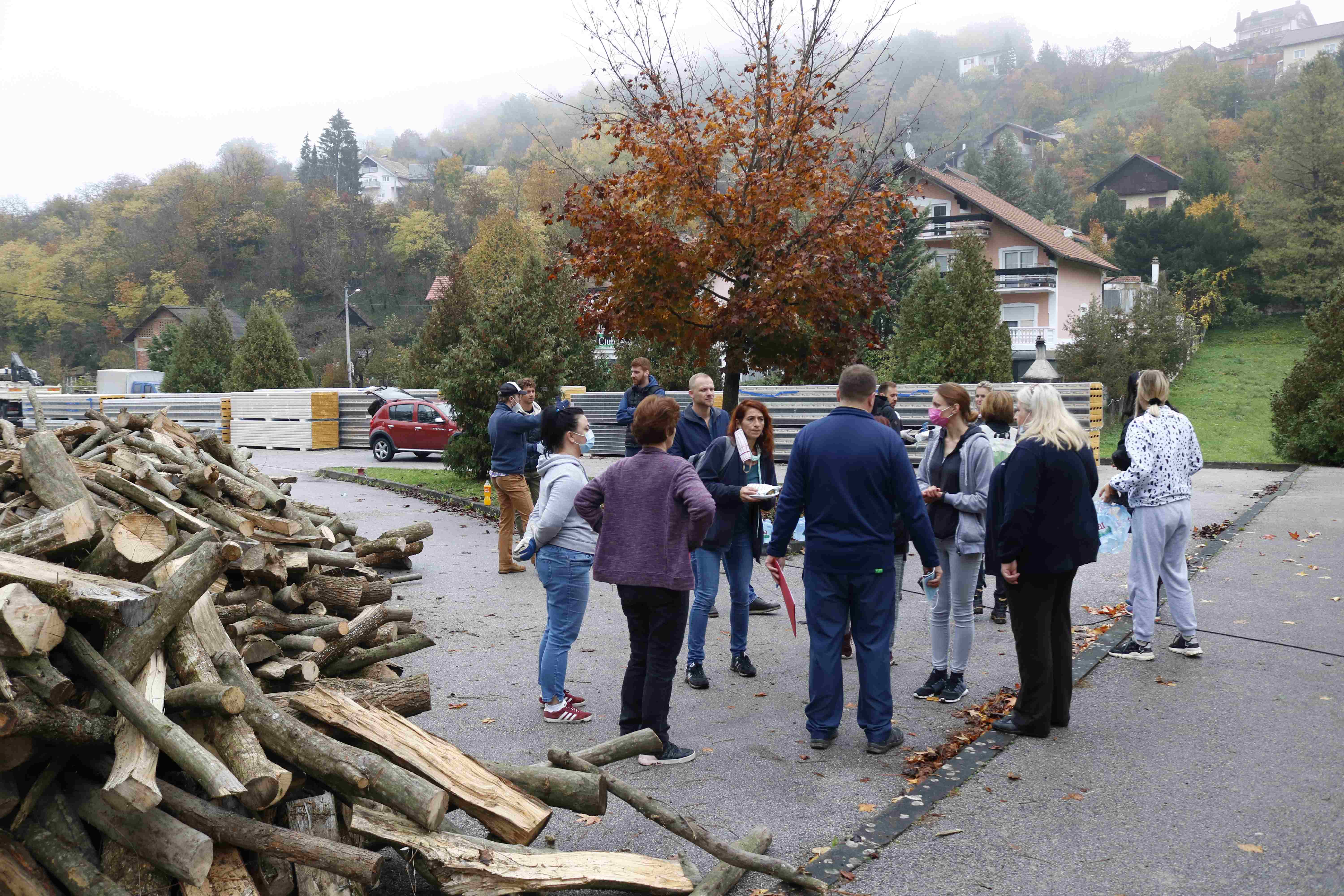 Zagreb volunteers gather in the early morning mist
Zagreb volunteers gather in the early morning mist
“Since we started, the numbers of Zagreb volunteers in our database has grown steadily. But, over more recent times, volunteering does seem to have become a more popular thing to do. And, many people have put their names forward for volunteering since the advent of the earthquake. In the immediate aftermath, there were so many people volunteering that we had to just direct people to the specific groups who were appealing for help. We even had to turn down some Zagreb volunteers who offered their time. That had never previously happened in the history of the organisation. Now, we are managing better and we help co-ordinate some of the actions ourselves.”
“Before the earthquake, the main volunteering areas to which we would send people were actions for children, the elderly, events like culture, sports and music festivals, animals, ecology projects and nature conservation.”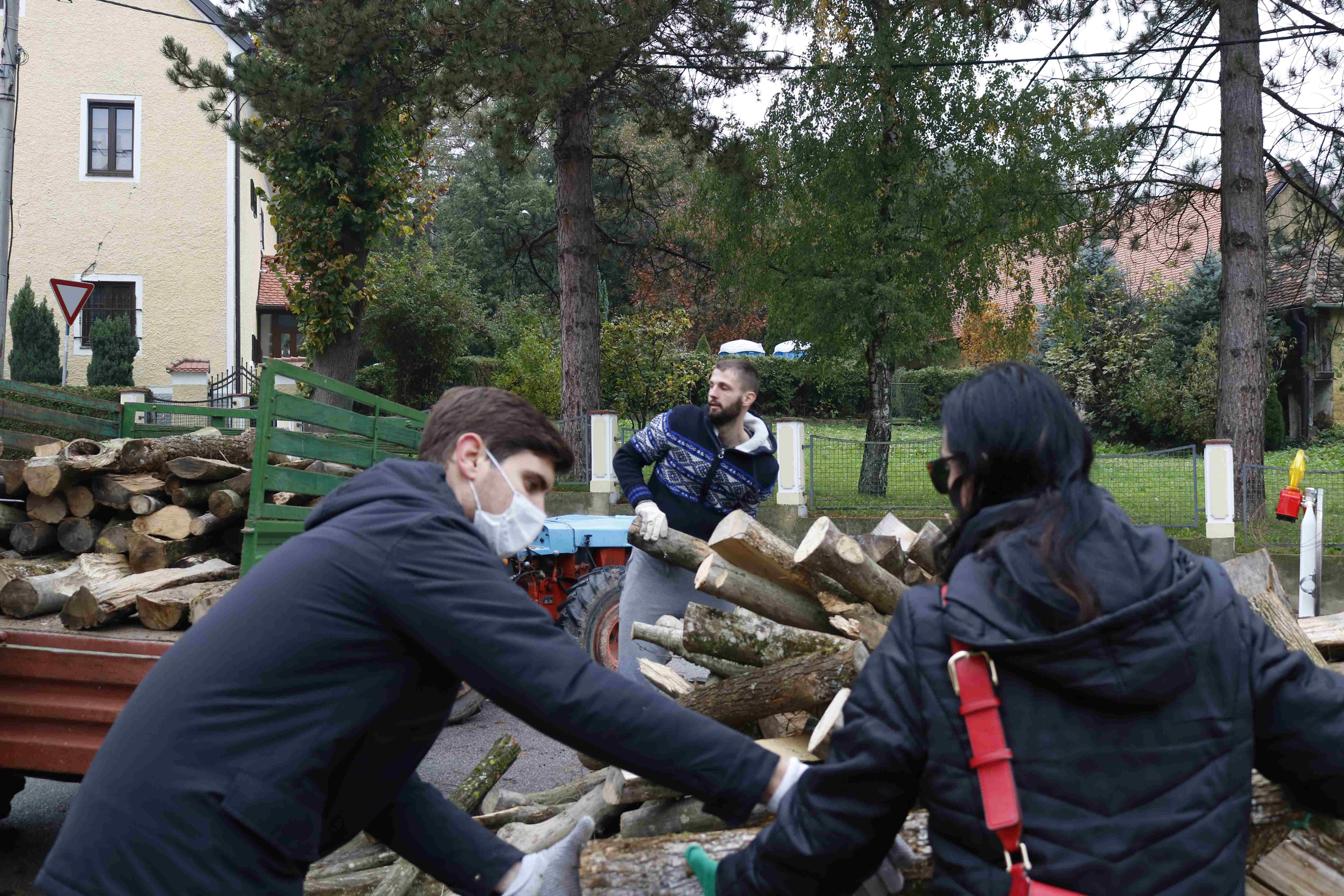 My name is Dražen Blažević (centre), I was born in Croatia. My mother and grandparents are all from Zagreb. This is the city where I live. At the moment, I don't have regular employment, so I can afford to give my time to an action like this. While I'm looking for a full-time job, I make ends meet by doing food deliveries on my bicycle. Why am I here today? Honestly, it was only two weeks ago that I just had this feeling that I should give my time to help people. In one minute I decided I would volunteer. Before this, the kind of help I would give was only to my neighbours, the elderly relatives of friends. People like that. As an official volunteer, this is my first time. Maybe this sounds a little selfish, but I thought it would make me feel good.
My name is Dražen Blažević (centre), I was born in Croatia. My mother and grandparents are all from Zagreb. This is the city where I live. At the moment, I don't have regular employment, so I can afford to give my time to an action like this. While I'm looking for a full-time job, I make ends meet by doing food deliveries on my bicycle. Why am I here today? Honestly, it was only two weeks ago that I just had this feeling that I should give my time to help people. In one minute I decided I would volunteer. Before this, the kind of help I would give was only to my neighbours, the elderly relatives of friends. People like that. As an official volunteer, this is my first time. Maybe this sounds a little selfish, but I thought it would make me feel good.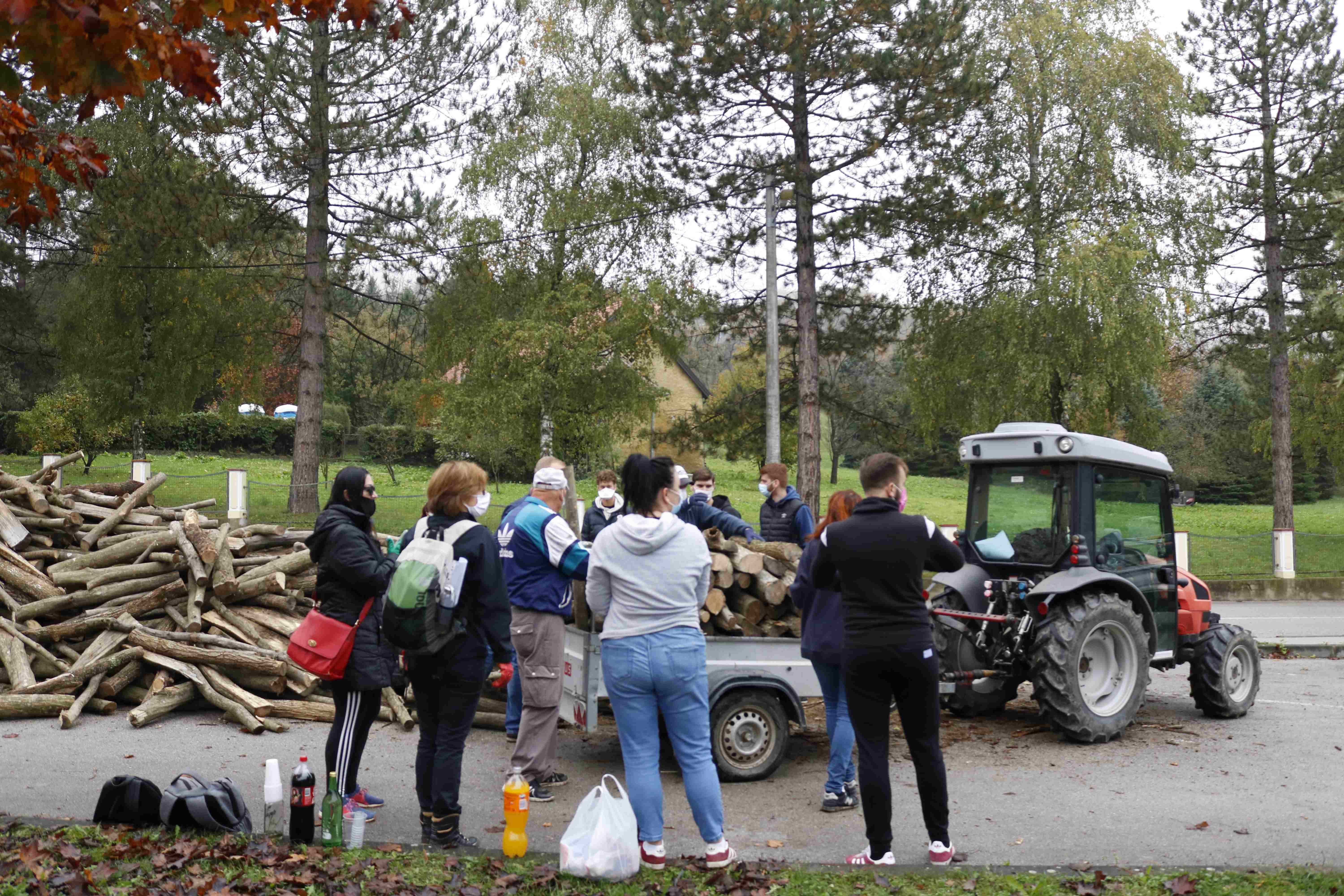
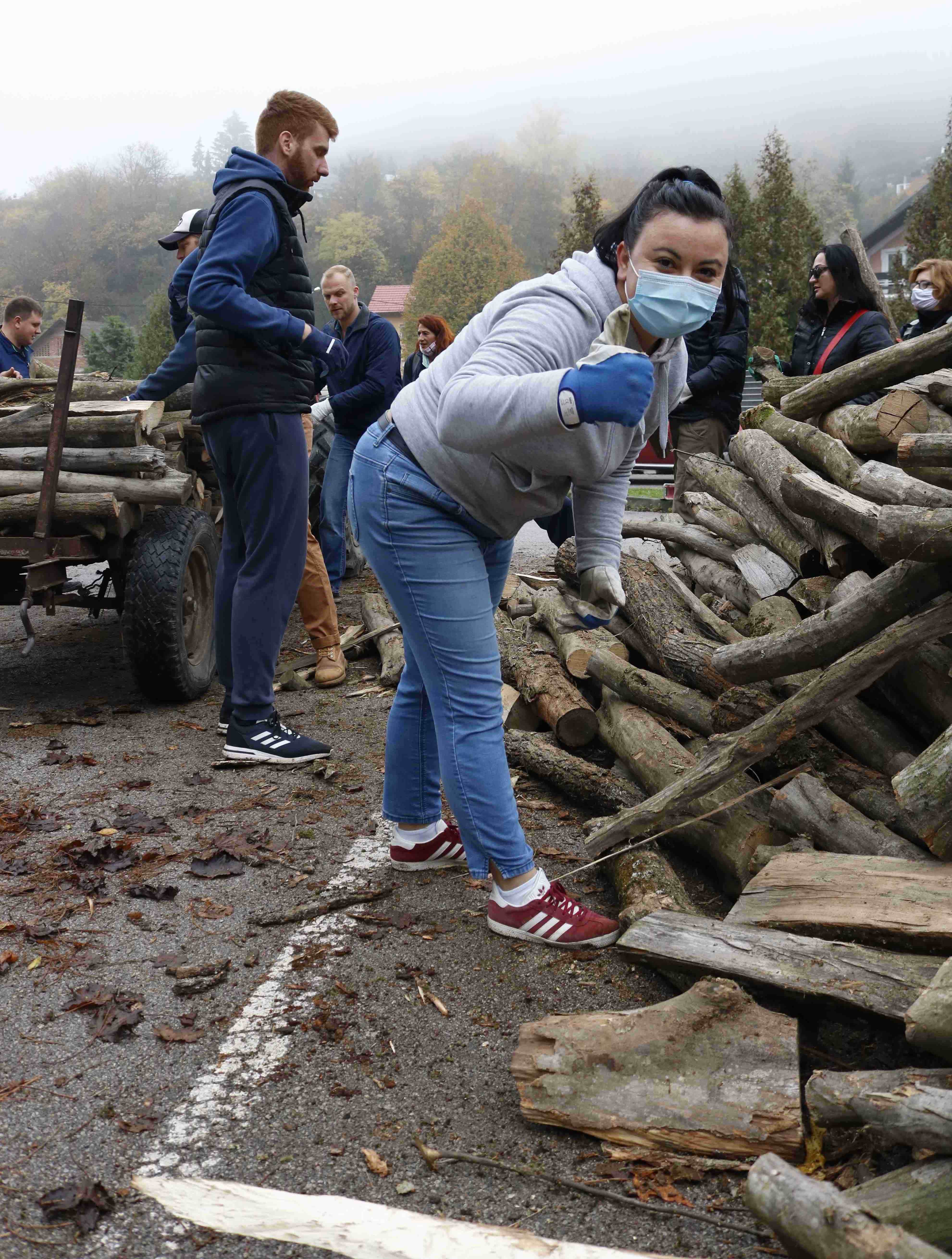 My name is Alexandra and I am from Čučerje. I live here with my family. Right now, I am without a full-time job, so I take on some other daily obligations – I accompany kids to kindergarten and school, and I help out in our local church. I look after their social media pages for them. I also play the organ in the church. It was a very simple decision for me to join in with today's action – I live here. I walk past the devastation left by the earthquake every day. This town has experienced lots of problems because of the damage. For me, giving my time today is a way of showing the love I have for my town and the people who live here. Well, something like that.
My name is Alexandra and I am from Čučerje. I live here with my family. Right now, I am without a full-time job, so I take on some other daily obligations – I accompany kids to kindergarten and school, and I help out in our local church. I look after their social media pages for them. I also play the organ in the church. It was a very simple decision for me to join in with today's action – I live here. I walk past the devastation left by the earthquake every day. This town has experienced lots of problems because of the damage. For me, giving my time today is a way of showing the love I have for my town and the people who live here. Well, something like that.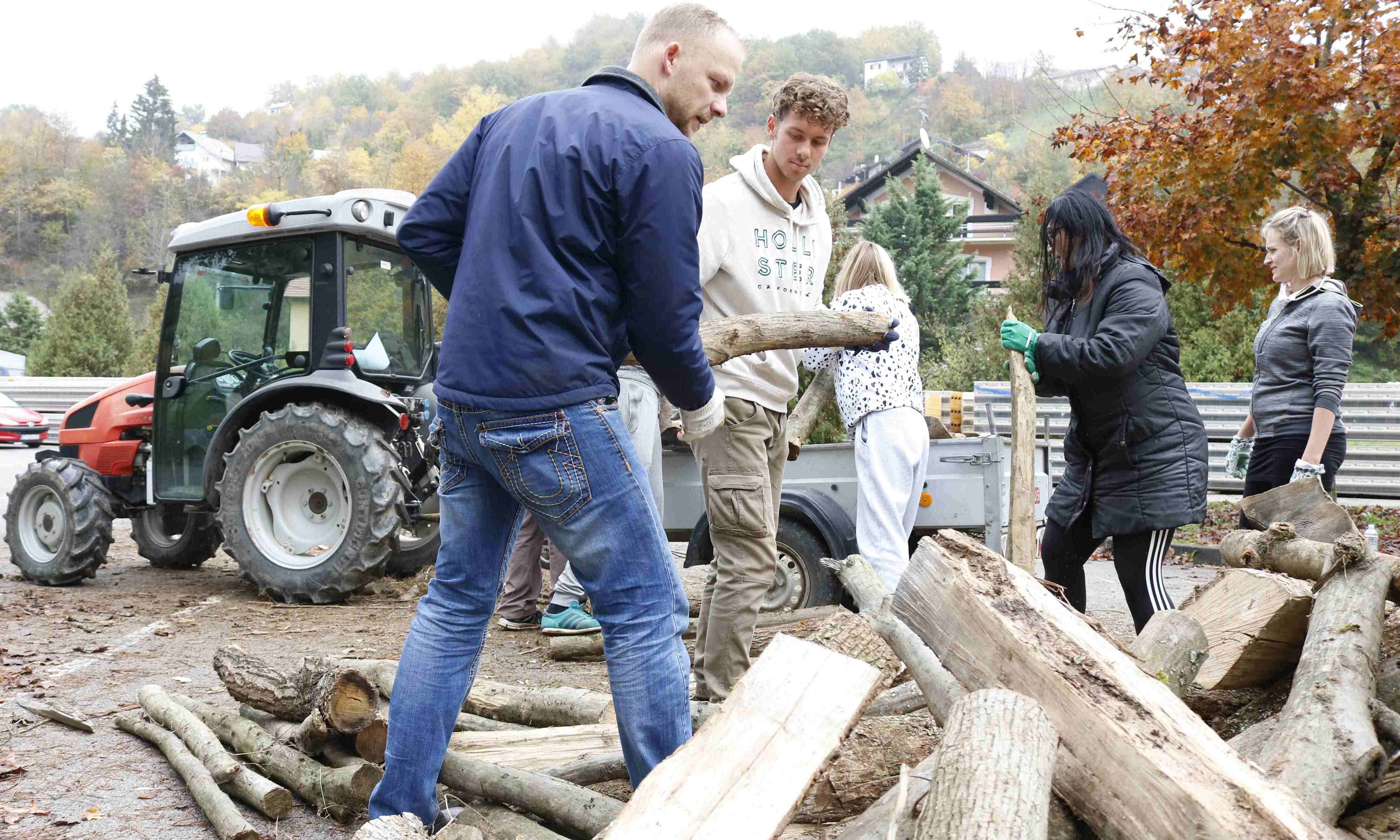
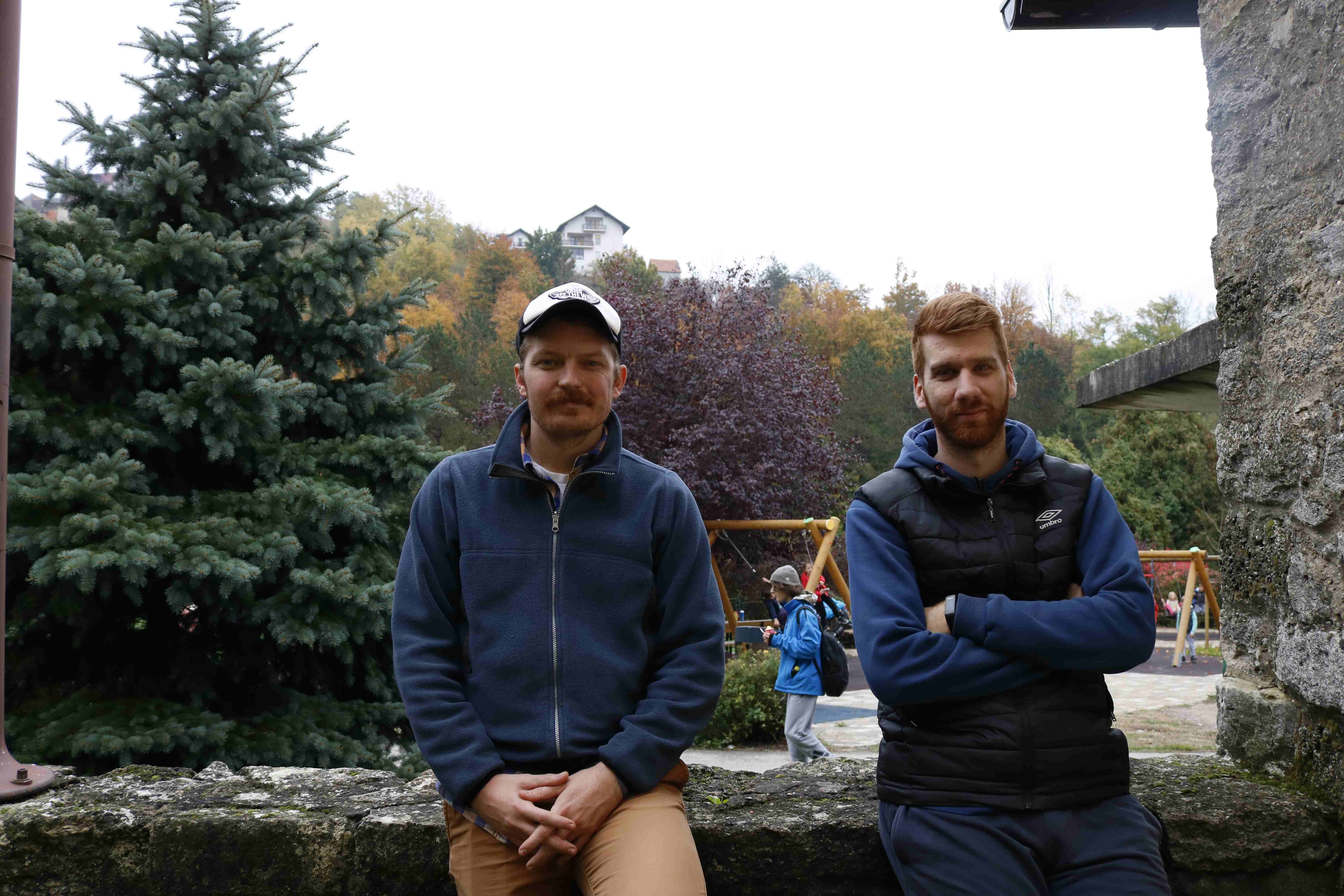 My name is Borut Babanić (right) and I'm from Zagreb. I work as a project manager. I wanted to volunteer so I could help people. The residents of Čučerje are some of the worst affected by the earthquake and so that's why I want to come here specifically. I wanted them to not feel that they are alone. This is the first time I joined an action via the Zagreb Volunteer Centre.
My name is Borut Babanić (right) and I'm from Zagreb. I work as a project manager. I wanted to volunteer so I could help people. The residents of Čučerje are some of the worst affected by the earthquake and so that's why I want to come here specifically. I wanted them to not feel that they are alone. This is the first time I joined an action via the Zagreb Volunteer Centre.
My name is Antonio Frinčić (left). I'm from Zagreb. I work for the Croatian Foundation For Children. It's an organisation that assists in looking after children and families who have small incomes or limited means. It's a state-funded organisation. My position there is a paid one. This is not the first voluntary work I've undertaken, but it is the first time I have volunteered through the Zagreb Volunteer Centre. My answer is the same as Borut's – I came here because I wanted to help these people.
Borut and Antonio are pictured side-by-side because they spent most of the day working together. When they arrived in the morning, they were strangers. They left as friends.
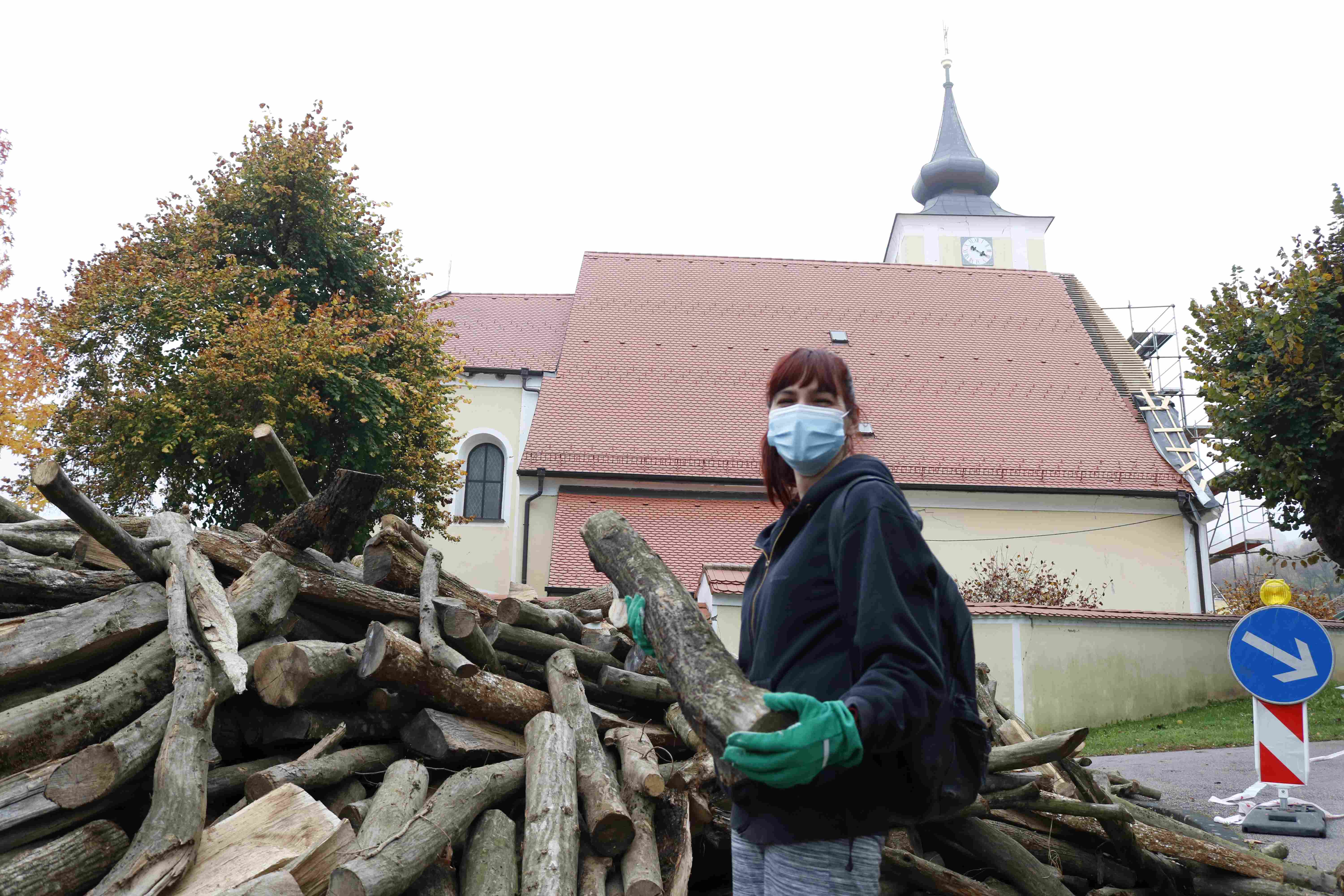 My name is Marina Krolo and I'm originally from Split. I studied in Zagreb, finished university here and then stayed. My regular role in society is that I'm a tour guide and tour leader. That pretty much means that this is my year off, ha! There's not much work for a tour guide in 2020, so I'm trying to put my free time to good use. This is the first time I've volunteered through Zagreb Volunteer Centre.
My name is Marina Krolo and I'm originally from Split. I studied in Zagreb, finished university here and then stayed. My regular role in society is that I'm a tour guide and tour leader. That pretty much means that this is my year off, ha! There's not much work for a tour guide in 2020, so I'm trying to put my free time to good use. This is the first time I've volunteered through Zagreb Volunteer Centre.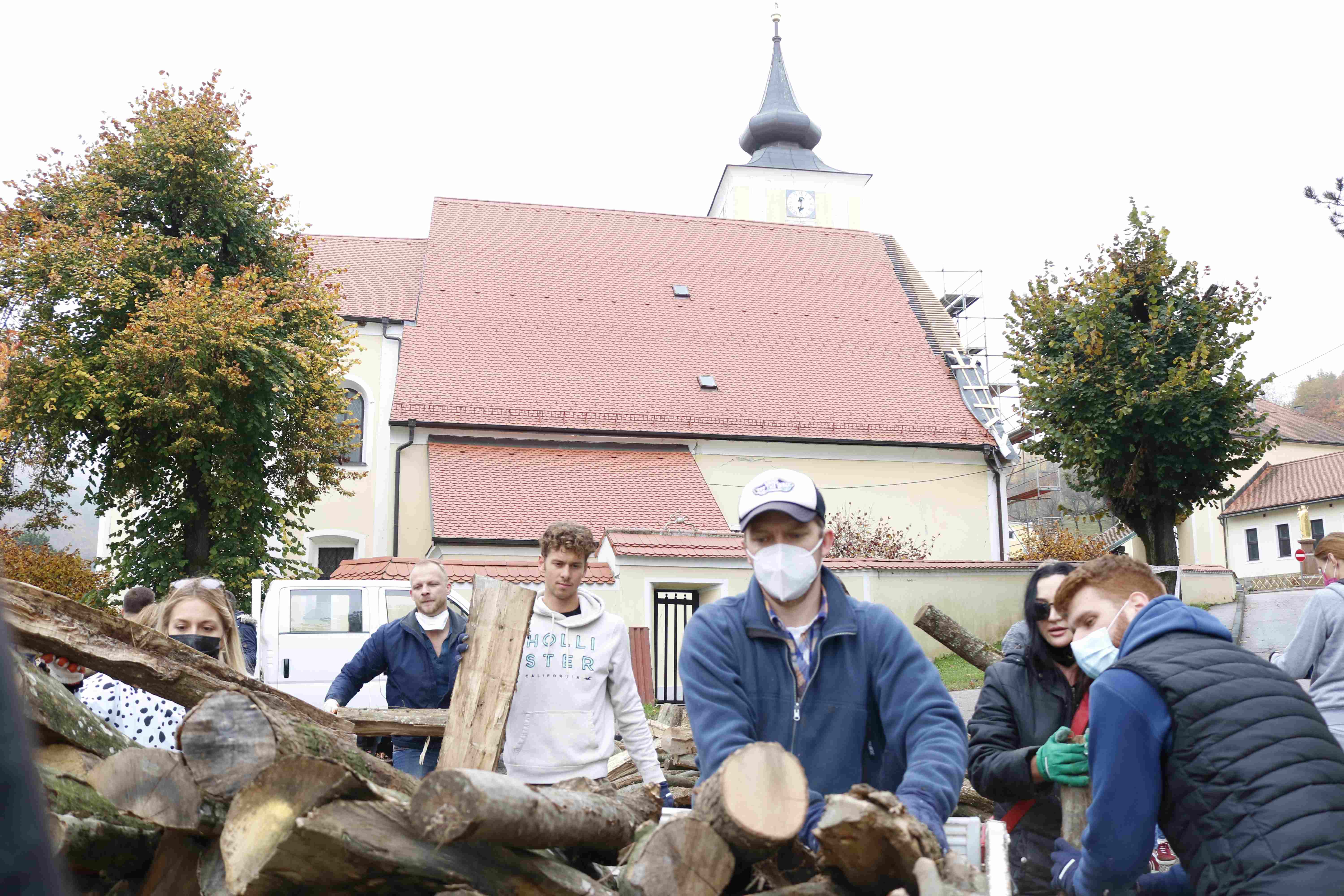
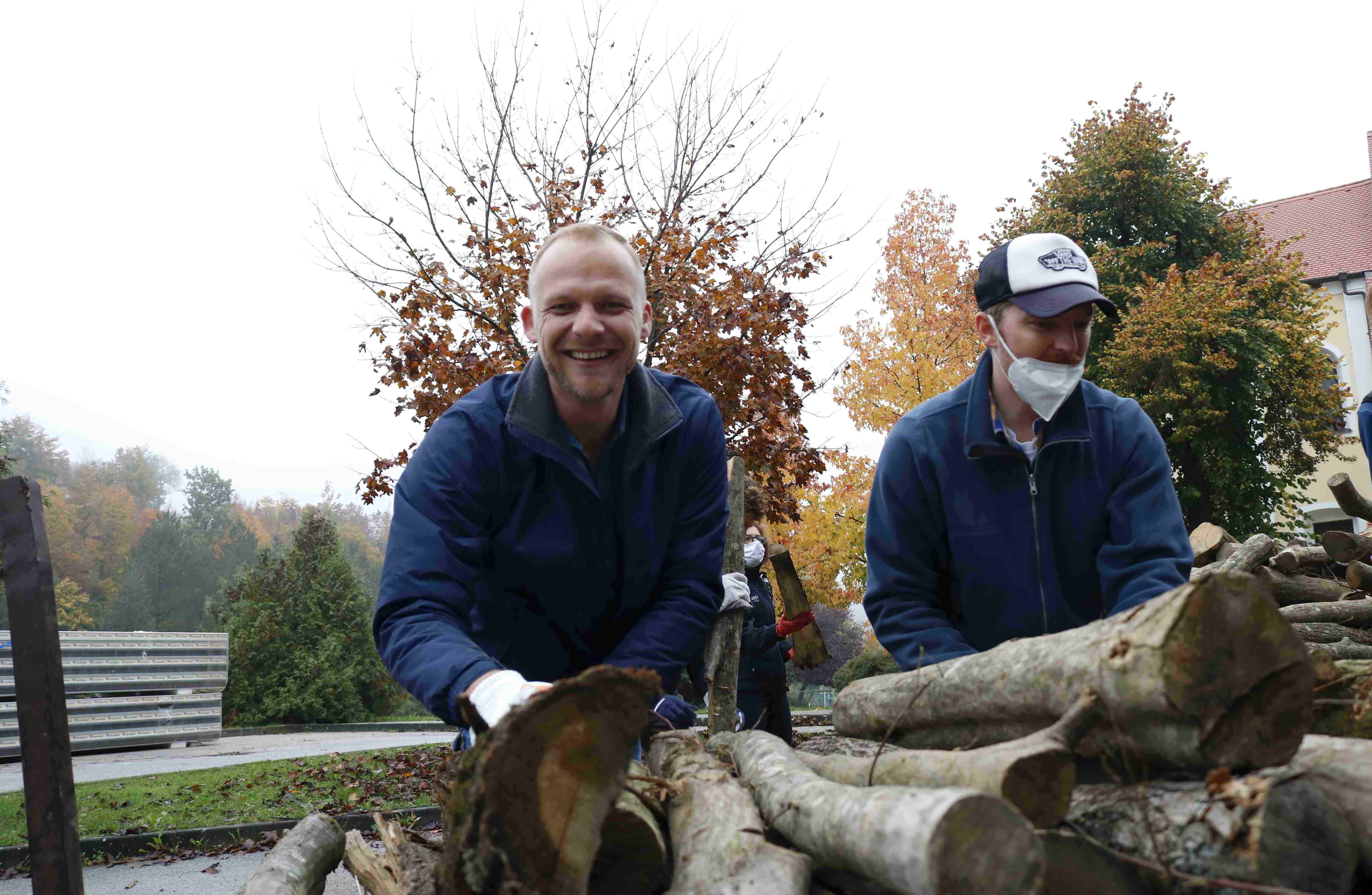 My name is Vincent Matijaca. I was born in Split. I'm based in Zagreb now. We opened a company BioCro LTD in the United Kingdom a few months ago. What we're trying to do is assist small producers and OPGs from this region to place their products internationally, including the UK and other countries in Europe. Why am I here today? Well, we believe that you can't start promoting sustainability and help solely from the office, we believe our project to be more hands-on. By doing that we hope to be able to show what we're about, and to set an example that perhaps others will follow. We've previously joined actions through other Croatian volunteer organisations and others internationally, but this is the first time we've done so through Zagreb Volunteer Centre.
My name is Vincent Matijaca. I was born in Split. I'm based in Zagreb now. We opened a company BioCro LTD in the United Kingdom a few months ago. What we're trying to do is assist small producers and OPGs from this region to place their products internationally, including the UK and other countries in Europe. Why am I here today? Well, we believe that you can't start promoting sustainability and help solely from the office, we believe our project to be more hands-on. By doing that we hope to be able to show what we're about, and to set an example that perhaps others will follow. We've previously joined actions through other Croatian volunteer organisations and others internationally, but this is the first time we've done so through Zagreb Volunteer Centre.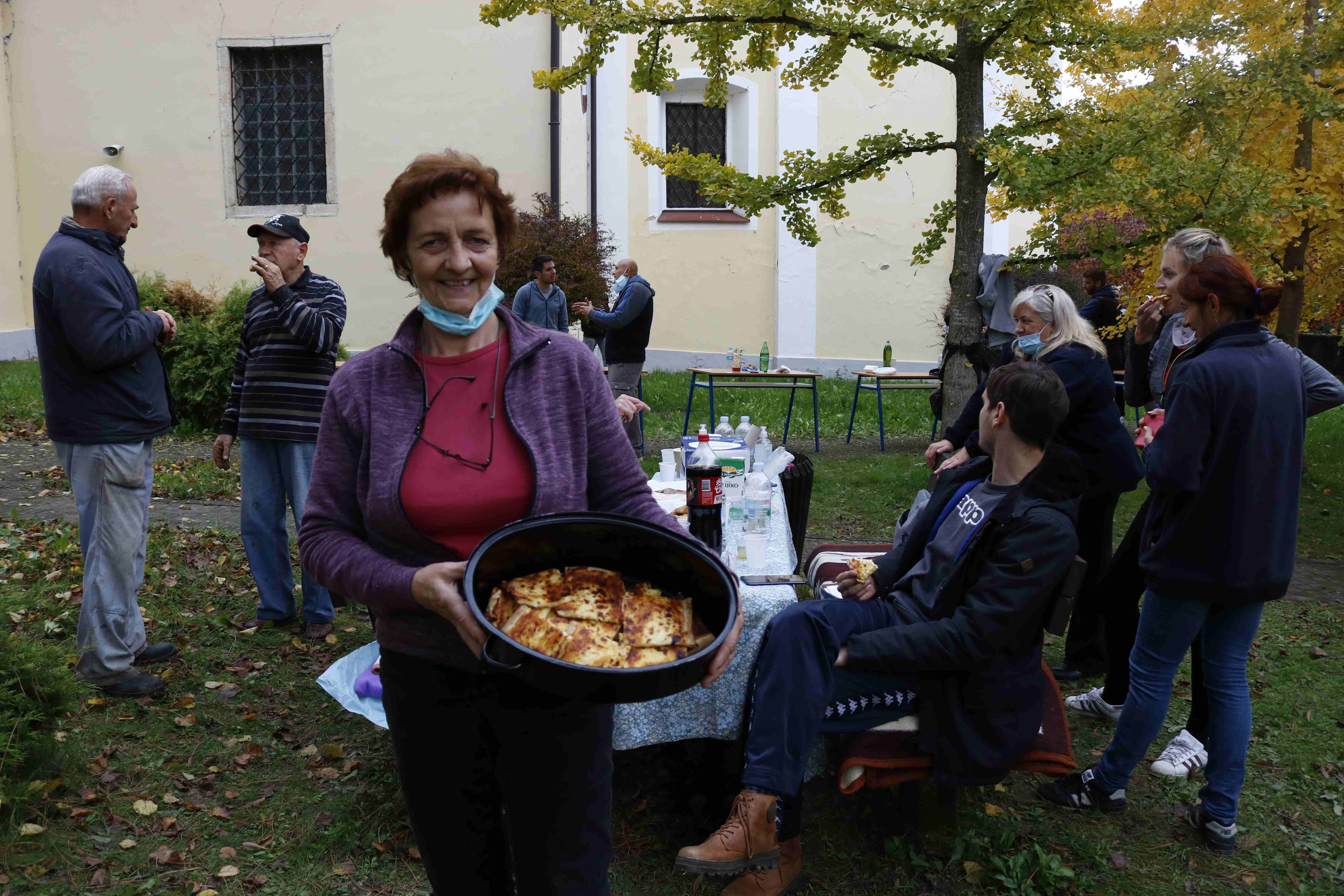 Local people from Čučerje and the surroundings had prepared food to make sure the volunteers didn't go hungry. This dish was made and donated by a local hairdresser. It is a local speciality called tenka gibanica. It was delicious.
Local people from Čučerje and the surroundings had prepared food to make sure the volunteers didn't go hungry. This dish was made and donated by a local hairdresser. It is a local speciality called tenka gibanica. It was delicious.
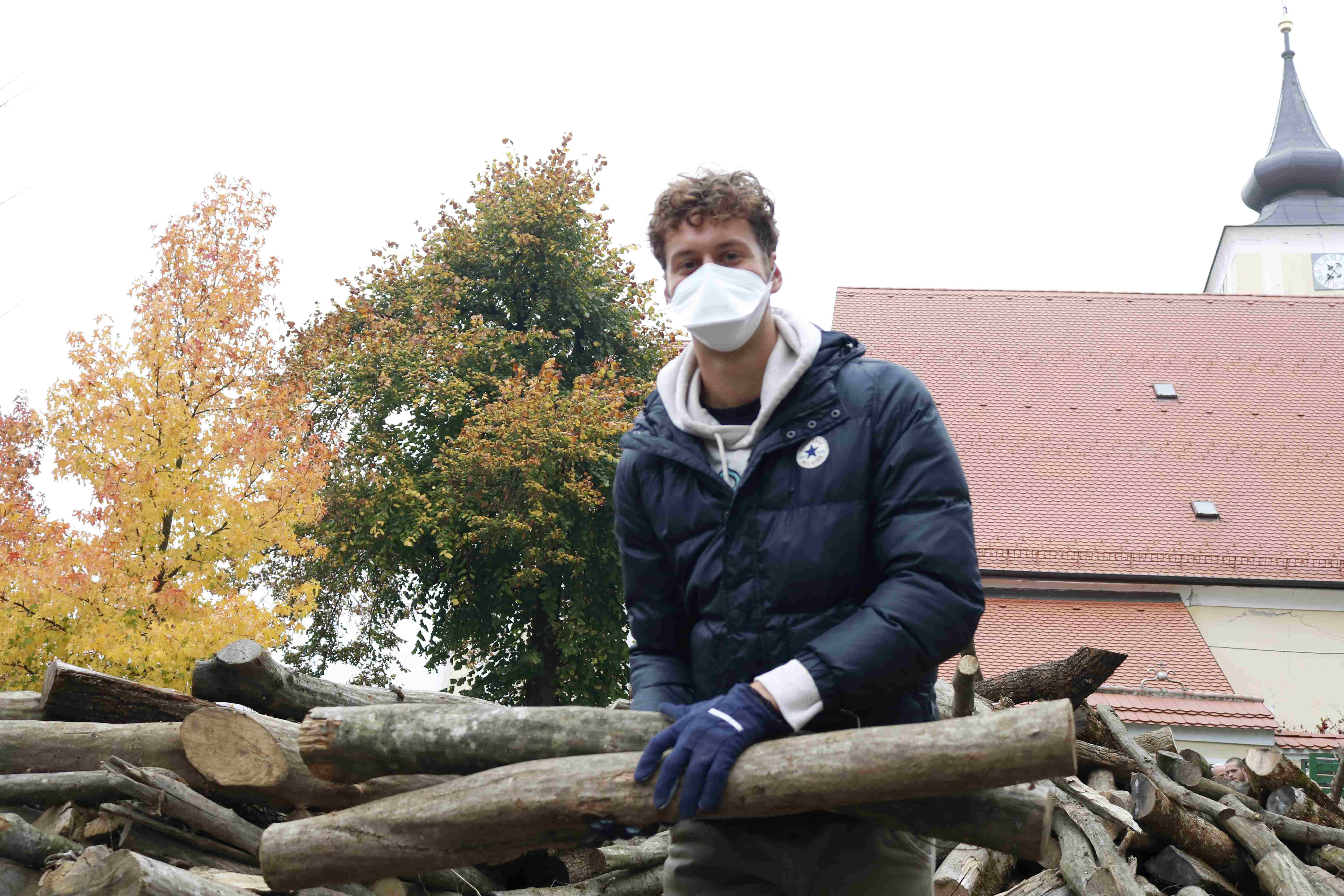 My name is Tomislav Vlajčić and I'm from Zagreb. At the moment, my regular time is spent studying economy and training football. I'm the team leader of a faculty-related group Tourism Lab that's interested in that area of our economy. This is my first time volunteering. I decided to come because it's a good opportunity to help people who are in need and I'm really glad I came. The experience was really worth it and meeting new people, seeing a slightly different culture is priceless. I would recommend it to anyone because it all starts with us.
My name is Tomislav Vlajčić and I'm from Zagreb. At the moment, my regular time is spent studying economy and training football. I'm the team leader of a faculty-related group Tourism Lab that's interested in that area of our economy. This is my first time volunteering. I decided to come because it's a good opportunity to help people who are in need and I'm really glad I came. The experience was really worth it and meeting new people, seeing a slightly different culture is priceless. I would recommend it to anyone because it all starts with us.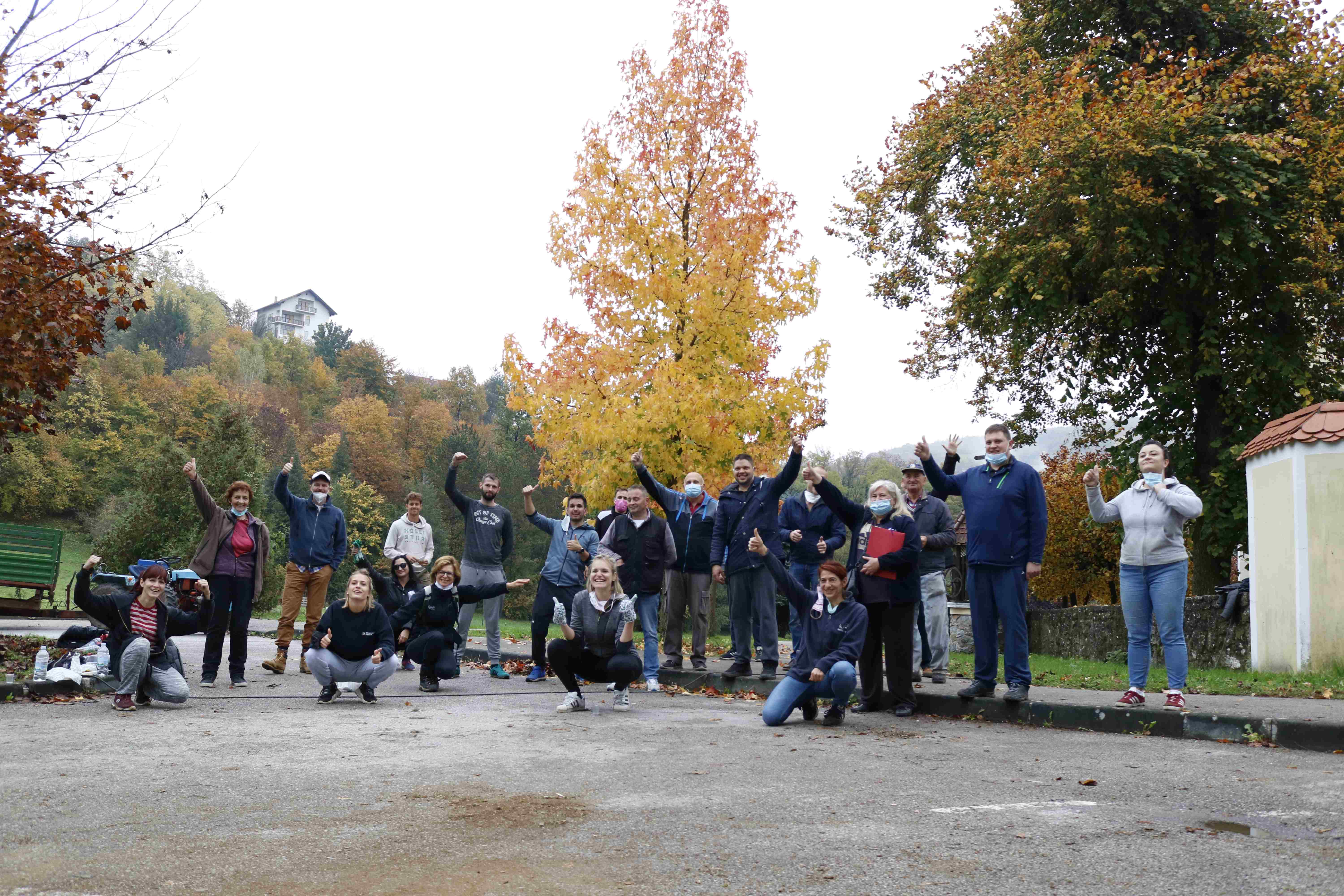
For the latest travel info, bookmark our main travel info article, which is updated daily.
Read the Croatian Travel Update in your language - now available in 24 languages.
Post Earthquake Zagreb Restoration to Take Ten Years?
As Novac/Vedran Marjanovic writes on the 2nd of October, 2020, the Zagreb restoration, which includes not only the city but also buildings in the surrounding area could take ten years, and one of the 'bottlenecks' of the Zagreb restoration project could be the role of conservator, said the president of the Croatian Chamber of Civil Engineers, Nina Drazin Lovrec.
''In Zagreb,there are 6000 damaged buildings in the upper and lower city (gornji and donji grad), which means that the role of conservator will be necessary. On the other hand, we currently have only 187 certified civil engineers for conservation work. In addition, a survey we recently conducted within the Chamber among 1,500 of our members in Zagreb and surrounding counties showed that only about 400 of them are ready to get involved in the Zagreb restoration and that of the city's surroundings,'' warned the president of HKIG at the Chamber's round table on the Zagreb restoration in which, among others, the Minister of Physical Planning, Construction and State Property Darko Horvat, associate professor at the Faculty of Civil Engineering Josip Atalic and expert in building statics Kresimir Tarnik took part.
Minister Horvat expressed his belief that the course of the Zagreb restoration will go smoothly in the chain from the 'snapshot' of the situation through the preparation of project documentation for reconstruction to the preparation of cost estimates and ordering the work itself to be carried out.
''The fear of slowing down the Zagreb restoration process lies in the resolving of property-legal relations and the ownership status of buildings as a whole. When we talk about financing the renovation in the part borne by the owners of the buildings, the state is ready to help through HBOR and other ways of lending,'' said Horvat.
The Minister warned that the state would once again bear the main burden of the Zagreb restoration, but that, he pointed out, this should finally be clear to everyone in Croatia that ownership is not only a right and benefit but also a responsibility.
''We're working on a bill that will regulate the issue of building maintenance and the responsibility of owners for it,'' announced Horvat, noting that the state will continue to encourage the energy renovation of buildings and lending to young families through subsidies for housing loans.
Josip Atalic estimated that the competent ministry, as the holder of the project for the reconstruction of the buildings damaged by the Zagreb earthquake, will face numerous difficulties, confirming that ownership relations are one of the obstacles to a quick and quality reconstruction.
''I wouldn't like to be in the shoes of Minister Horvat at all, especially when I know what's happening on the ground and how high the expectations of people are from the reconstruction. Many, for example, will probably not be satisfied with the quality of the reconstruction,'' Atalic commented, noting that one of the problems in this regard could be the fact that there are about 100,000 requests in Zagreb for the legalisation of illegally built or upgraded property, among which, he added, there are many buildings which were themselves damaged in the earthquake.
Referring to the frequent assessments that a significant number of buildings were damaged in the earthquake because they weren't well maintained, Atalic noted that the earthquake also damaged buildings that underwent energy renovation.
Some participants in the HKIG meeting expressed confidence that the reconstruction of the quake-affected areas could take five years, but with the caveat that everything will depend on the preparation of project documentation, the length of public tenders and the availability of companies and workers for commissioned work. It is much more likely that the stumbling blocks along the way will make the process take far longer, perhaps an additional five years more.
For the latest travel info, bookmark our main travel info article, which is updated daily.
Read the Croatian Travel Update in your language - now available in 24 languages
Croatian Sense Of Humour Undiminished By Continuing Earthquakes
September 2, 2020 – Declarations of love, funny trading offers for chickens, appeals for dates and creative swearing have lightened the mood after earth tremors, as the Croatian sense of humour spills over into the unlikely forum of an earthquake-reporting app
The earthquake of 22 March 2020 was an unforgettable experience for anyone in Zagreb. The strongest to have hit the Croatian capital in 140 years, it has naturally been followed by a series of aftershocks. Eight particularly forceful tremors have been accompanied by more than 1000 smaller aftershocks. The vibrations have become as much a part of 2020's everyday life in Zagreb as putting on a mask.
While some still become mortified by these tremors, many Zagreb residents have now become accustomed to this low rumbling of the ground. They can now laugh and joke about it.
The Croatian sense of humour is a diverse beast – it can be dark, brutal, scathing, self-deprecating, gentle, simple, outrageous, creatively profane or simply just bizarre. In this diversity and relentless ability to laugh at all situations, the Croatian sense of humour and that of some immediate neighbours, is much closer to that which the British have rather than other Europeans. It is British comedy shows that regularly delight Croatian TV audiences, not those from Germany, France or Italy. © Alexas_Fotos
© Alexas_Fotos
Jokes and swearing about the earth tremors are a classically Croatian response. Alongside the Croatian sense of humour and general tomfoolery, they have recently spilled over into an unexpected forum. The European-Mediterranean Seismological Centre is a pretty serious institution. It was established in 1975 and has 84 professional institutes as members in as many as 55 different countries. Their app is a world leader for the public reporting of earth tremors. Although, in the hands of funny Croatians, it has of late become a bulletin board for declarations of love, statements of the surreal, an app for trading and dating.
"Matija, I love you" read one of the first comments in response to the latest aftershock, which occurred on Friday 25 September. "Nikolina from Jazbina, I love you," declared another.
"I'm opening the bottle, is there any frightened girl nearby so that we can be scared together?" appealed one lonely chancer from the Kvatrić neighbourhood. Rather bafflingly, another simply wrote “Milk shake. Strawberry.”
This weekend's corruption of the EMSC app is not without precedent. “Does anybody here have any yeast? Dubrava and surroundings” begged one local, several weeks ago. Another trader at least made reference to the earth tremors when he advertised “I sell chickens. They are small and stressed out - and will remain small! I buy chickens, too. But only those who are resistant to earthquakes.”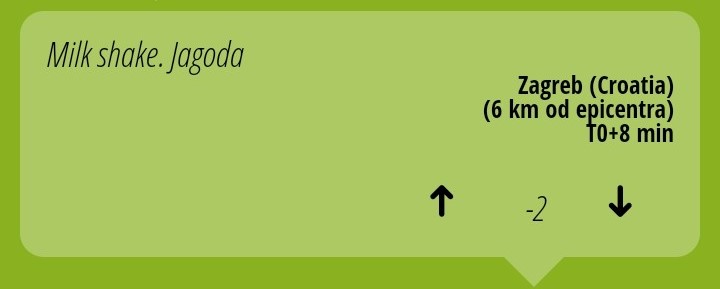
For the latest travel info, bookmark our main travel info article, which is updated daily.
Read the Croatian Travel Update in your language - now available in 24 languages
160 Voluntary Activities will be Held, Says VL Daily
ZAGREB, Sept 24, 2020 - In a campaign being held under the slogan "An Important Social Network" until Saturday, as many as 160 voluntary activities will take place all over Croatia, and citizens of Zagreb are helping Cucurje, which had suffered extensive damage in the earthquake, the Vecernji List daily said on Thursday.
The campaign is being led by the Croatian Volunteer Development Centre as part of the "Croatia Volunteers" project, and it encompasses 160 voluntary activities taking place until September 26 in the entire country.
Zagreb volunteers have chosen Cucerje, a suburb located near the epicenter of the earthquake.
The Cucerje Primary School was badly damaged in the earthquake and has been renovated since, and to the delight of its pupils, volunteers from Zagreb have painted the fences, planted fruit trees, and painted a mural on the school building.
"We have been here since April, and when we just arrived, it did not seem as if the earthquake did a lot of damage, but when we entered the houses, we realized that the people had lost everything, which shook us. Some families are still living in container houses and caravans in their gardens, so we are trying to make things easier for them as much as we can," said Jela Prgic Zrnika, head of the Volunteers' Centre Zagreb, as carried by the Vecernji List daily.
For the latest travel info, bookmark our main travel info article, which is updated daily.
Read the Croatian Travel Update in your language - now available in 24 languages!
Post-Earthquake Worries See Zagreb Residents Move Out of Centre
September the 22nd, 2020 - The Zagreb earthquake is still very fresh in the memories of those of us who woke up to the deafening sound of it and our buildings shaking. It has been half a year since it occurred, but it is unlikely to leave our minds anytime soon. For some Zagreb residents, that and a few other factors has seen them seek land and property outside of the centre of the city.
As Poslovni Dnevnik writes on the 21st of September, 2020, back during quarantine, when the economy was locked down, the real estate market almost stopped in its tracks. After the re-opening of the economy - interest in real estate in Croatia is growing once again.
According to insiders, the situation on the market across the country could now be described as almost normal, given that the demand is considerable, while at the same time there is significantly less quality real estate on offer than is required. Along with Zagreb, Rijeka, Osijek, Split, Pula and Zadar are the cities where the offer of apartments for sale has been the most searched lately.
Borislav Vujovic, vice-president of the Real Estate Association at the Croatian Chamber of Commerce, told HRT that real estate in the centre of Zagreb had become unattractive to Zagreb residents currently living there and for those considering a move from elsewhere due to the recent earthquake.
He pointed out that the location of the buildings is attractive, but not the buildings themselves. Vujovic said the asking price was about 500 euros lower than before March the 15th, 2020.
"It should be taken into account that the prices of newer buildings in the centre are stable and they are more attractive than they were before. Their prices are rising, but since there are fewer of them, they don't affect the prices in the city centre,'' he emphasised.
Vujovic added that the Zagreb residents who went through the earthquake want to go outside the city and are looking for land to build quality and safe houses themselves. He emphasised that the coronavirus also influenced the departure of Zagreb residents from the centre of Zagreb. "There is an increased interest in more peripheral locations and in houses and land in such locations," said Borislav Vujovic.
He pointed out that the prices at these locations hadn't risen as much as land and houses are now being sold on them. "The turnover of houses was much lower than it is today. However, today the situation has changed,'' he said.
As for the coast, he said there is great interest from foreigners in buying real estate. "This year there was absolutely demand, our traditional buyers, Slovenians, Austrians and Germans are coming and looking for real estate," he said.
Vujovic added that foreigners aren't only looking for apartments located along the first row to the sea, but also houses which are more isolated. Vujovic said that while the collapse of the market didn't happen, no growth is expected.
He added that those who can take advantage of loan subsidies through APN should absolutely take advantage of it. He emphasised that the situation is different now than it was back in 2008 because we have historically low interest rates on savings and loans. ''It's difficult to compare the situation then and now," he said.
For the latest travel info, bookmark our main travel info article, which is updated daily.
Read the Croatian Travel Update in your language - now available in 24 languages
How Much Will Insurance Providers Pay Out for Zagreb Earthquake Damage?
As Novac/Vedran Marjanovic writes on the 19th of September, 2020, Croatian insurers have so far paid out for 6,255 claims for earthquake insurance policies in the total amount of 194 million kuna, the leaders of the Croatian Insurance Bureau announced. They state, however, that they're still receiving requests from people due to Zagreb earthquake damage.
''Although we're still receiving requests for Zagreb earthquake damage assessments and part of the requests are still being processed, the amount of damages paid out so far, when looking at the total amount of Zagreb earthquake damage in the city and its surroundings, things clearly indicate that we as a society are significantly uninsured or at least underinsured,'' said a member of the Management Board of Croatia osiguranje, Vanco Balen.
Stating that the average premium for earthquake insurance stands at around 800 kuna, Balen stated that the average damage amount paid out for this year was more than 30,000 kuna, concluding that the damage was, in many cases, far higher than the annual average premiums amount to.
The Croatian Insurance Bureau estimates that insurers will pay out a total of 400 million kuna to 500 million kuna in damages in connection with the earthquake which struck Zagreb and its surroundings back in March this year. They note that general global experience shows that the deadline for payment for earthquake damage is about two years.
Balen warned that the March earthquake in Zagreb was not a solitary natural disaster, that floods and storms were frequent, concluding that ''insurance is a civilizational response to situations such as natural disasters''.
''If we know that the previous earthquake recorded with the same strength as the one in Zagreb back in March this year took place 140 years ago, we can say that we can be calm for the next 140 years. But is that so? I'd like to remind you of the statement of Professor Snjezana Markusic that the fact that we had a magnitude 6.3 earthquake in March indicates an increased possibility of a new earthquake, perhaps even one of a stronger magnitude,'' warned Slaven Dobric, a Member of the Management Board of Allianz osiguranje and President of the Croatian Insurance Bureau.
In the years preceding this year's earthquake, the total premium of Croatian insurers in earthquake insurance was about 80 million kuna. Insurers expect that this year the aforementioned premium will reach 110 million kuna.
''On the day of the earthquake alone, we had many more insurance policies agreed online for earthquakes than we usually do, which speaks of the growing awareness of citizens about the importance of this policy. But raising that awareness must be further accelerated through the strengthening of financial literacy and the like,'' commented Vanco Balen.
The President of the Management Board of Euroherc osiguranje, Ivana Bratanic, pointed out the comparison of the average insurance premium per capita in the European Union of 2,170 euros with the same Croatian indicator of only 347 euros.
''If we increase the level of awareness about the necessity of investing in insurance, we'll also reduce the financial burden of the state in repairing damages,'' warned Ivana Bratanic when discussing the Zagreb earthquake damage payments.
As an additional lever for the more effective protection of property from earthquakes, insurers suggest contracting insurance policies for common areas in residential buildings, which, they say, were generally not contracted in buildings in the centre of Zagreb, which were hit hard by the earthquake which rocked the city back in spring.
Insurers welcomed the recently passed Law on the Reconstruction of Buildings Damaged by the Earthquake in Zagreb and its Surroundings, because, as Slaven Dobric pointed out, citizens who had adequate insurance coverage will have a reduced financial burden during the reconstruction.
For the latest travel info, bookmark our main travel info article, which is updated daily.
Read the Croatian Travel Update in your language - now available in 24 languages


